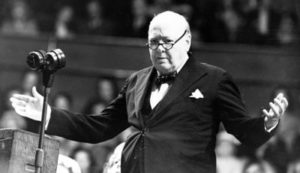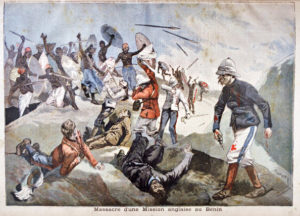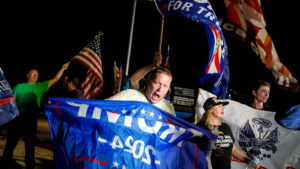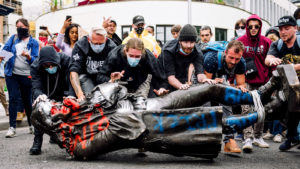The historical epic The Woman King, which has just opened at the US box office to an ecstatic reception, is a truly remarkable film. Set in 19th-century West Africa and starring Viola Davis and John Boyega, it’s a tale of soaring idealism and surging passion; of brutal violence and burning anger; of dreams made and broken, of myths and mysteries, of lies and betrayals, of the vaulting ambitions and festering hypocrisies of a society in the throes of a profound cultural revolution. I’m talking about America, of course, not Africa. All this is before the film has even started.
I’ll come to all the controversies in a moment. But on one level, the story behind The Woman King is actually pretty simple. As its producer, the former Hollywood actress Maria Bello, has explained, she came up with the idea a few years ago after visiting the West African republic of Benin. There she had learned about a regiment of immensely fierce female warriors called the Agojie, who fought for the Kingdom of Dahomey in the 18th and 19th centuries. Entirely predictably, European travellers, missionaries and slave-traders called them “Amazons” — and since few of us can resist a story about terrifying statuesque Amazons, Bello was immediately struck by their cinematic potential. And with Marvel’s Black Panther having proved that there’s an enormous international audience for stories with sword-wielding black heroes, Sony executives agreed with her. So far, so uncomplicated.
What of the plot? Again, not very complicated. Historical epics usually tend to be pretty melodramatic, with impossibly admirable heroes and fiendishly cruel villains, and The Woman King is no exception. To cut a two-and-a-quarter-hour story mercifully short, we are in Dahomey in the 1820s. King Ghezo, played by John Boyega, is basically a decent fellow, at least by the standards of warrior kings in turbulent times. He depends on Viola Davis and her regiment of Amazons, not least against his neighbours, the Oyo, whose murderous, rapacious leader is in league with Portuguese slavers.
There are various familial goings-on of the “Luke, I am your father” quality, but we don’t really need to get into them now. Does one apparently orphaned character turn to be the daughter of another? I’m not saying. Anyway, in an entirely unpredictable development, some of the goodies are taken prisoner. Equally unpredictably, the king is reluctant to stake everything on a risky rescue mission. So in a twist that nobody could possibly have imagined, Viola Davis defies orders and leads an expedition to save them anyway. (You may think you’ve seen this before, but you haven’t, because it wasn’t set in Africa when you did see it before, so this time it’s completely different.) So what happens? Well, I don’t want to spoil it. Are they all slaughtered where they stand? Does the film end on a startlingly low note? Or do the goodies win the day? You’ll have to see it yourself to find out.
The producers claim, as they always do, that The Woman King is “based on true events”. And in fairness, they’re not entirely wrong. There certainly was a kingdom of Dahomey in the 19th century: proud, independent, fiercely aggressive — and that’s putting it mildly. The historian Stanley B. Alpern, author of the definitive English-language history of the Agojie, calls it a state “dedicated to warfare and slave-raiding…with the king controlling and regimenting practically every aspect of social life”. One of those kings was indeed called Ghezo. And the Agojie definitely existed, too. As an excellent essay for the Smithsonian magazine explains, they were probably founded around the turn of the 18th century, and boasted some 6,000 female warriors who “raided villages under cover of darkness, took captives and slashed off resisters’ heads to return to their king as trophies of war”.
So were they as intimidating as the film suggests? Even more intimidating, actually. Forbidden from sleeping with men, the Agojie were recruited when young and forced to undergo the kind of military training that would turn most of us into conscientious objectors. One British traveller described how they were forced to scramble across dense thickets of acacia thorns, without anything to protect their feet from bleeding.
Other tests were designed to desensitise them to the horrors of combat. Every year, according to the Smithsonian, “new recruits of both sexes were required to mount a platform 16 feet high, pick up baskets containing bound and gagged prisoners of war, and hurl them over the parapet to a baying mob below”. And in perhaps the most horribly memorable detail, a French officer called Jean Bayol watched as a teenage recruit called Nanisca, “who had not yet killed anyone”, was brought before a captured young man whose hands were bound. According to Bayol, she “swung her sword three times with both hands, then calmly cut the last flesh that attached the head to the trunk. … She then squeezed the blood off her weapon and swallowed it.”
Nice. It was this Nanisca, by the way, who seems to have inspired the name of Viola Davis’s character. She ended up her days fighting the French, cutting the head off an artillery officer before being shot down in her turn. It was what she would have wanted. Of course plenty of historical films romanticise their terrifyingly violent heroes, as anybody who has seen Gladiator or 300 will attest. Such is the nature of storytelling. The problem for The Woman King, though, is that Dahomey wasn’t just a violent society; it was a violent slave-trading society. Hence the tsunami of controversy.
Although we’re always been told that slavery is a terribly difficult and complicated subject, the history behind all this is actually pretty straightforward. Slave-trading was enormously important, if not essential, to the kingdom of Dahomey. As the Brazilian historian Ana Lucia Araujo has pointed out, Dahomey’s expansion was exactly contemporary with the heyday of the Atlantic slave trade. In particular, Dahomey seized and controlled the port of Ouidah, one of the most important hubs in the entire network. From here, hundreds of thousands, perhaps even a million African captives were forcibly embarked on ships for the New World.
And although this was a story in which European slave-traders played a leading role, the women warriors of Dahomey were hardly innocent. Quite the reverse. As Araujo notes, The Woman King opens with a scene in which the Adojie attack a neighbouring village, killing the men but chivalrously sparing the women. This is pure fiction, though. In reality, she writes, “the soldiers of the Dahomean army (both women and men) would take the healthy, younger villagers as prisoners and walk them to Dahomey’s capital, Abomey”. Here some would become local slaves, others butchered in human sacrifices. But “most would be transported to the coast, where they would be sold, and board slave ships sailing to the Americas, especially Brazil”.
This isn’t the only distortion of the truth. In the film, King Ghezo is persuaded to end Dahomey’s reliance on European slave-traders and embrace palm-oil production instead. But this is nonsense. Indeed, to his neighbours, the idea that he and his Amazon warriors were reforming liberators would have seemed downright obscene. In reality, Ghezo was as brutal and self-interested as any European imperialist. When he seized the throne in 1818, one of his first acts was to punish his family rivals by selling them into slavery. And for much of his reign he actively resisted pressure from Europe to end the trade in human beings, since by the 1830s and 1840s the British were vigorously trying to stamp it out, even blockading his coastline with Royal Navy ships.
Does all this matter? Maybe not. To repeat: all historical films turn fact into fiction. If you go to Hollywood for your history, that’s your problem, not theirs. Addressing her critics in Variety, Viola Davis insisted that a movie is just, well, a movie. “If we just told a history lesson, which we very well could have, that would be a documentary,” she said bluntly. “Unfortunately, people wouldn’t be in the theaters.” As for John Boyega, he fell back on the kind of impenetrable gibberish for which actors have long been admired across the world. “Art can live in a moral or immoral space and could sometimes just be about shining a light on human nature, history, and the reality of that conflict,” he said gnomically. “So, for me, including that just shows that there is a way in which we can embrace stories that accept the fact that humanity is not perfect, while also being entertaining and something you can learn from.”
What does that mean? I suspect we will never know.
But because it’s Africa and it’s slavery, some people don’t see this as a trivial matter at all. A month ago the New York Times’s Nikole Hannah-Jones, mastermind of the crazy “1619 Project” to rewrite all American history around the theme of slavery, issued an ominous warning that she was looking forward to seeing “how a movie that seems to glorify the all-female military unit of the Dahomey deals with the fact that this kingdom derived its wealth from capturing Africans for the Trans-Atlantic slave trade”. The New Yorker, poring over the film’s many distortions, condemned it as not merely “muddled” and “disingenuous” but a “cynical distortion of history”.
And on Twitter, the usual suspects have been out in force, pitchforks at the ready. In a way it doesn’t really matter which side you’re on; merely to enter the lists is to expose yourself to charges of heresy. So when Ana Lucia Araujo, expert on the slave trade at Howard University, ventured online to discuss a book about another African warrior queen from Angola, and made the mistake of using the word “deported” to describe the transportation of slaves across the Atlantic — well, that was the end of her. “The absolute caucasity of this person!” thundered one of her critics — himself, judging by his picture, distinctly Caucasian. Academics, eh? “What an absolute clown show!” read one reply. Well, you said it.
At heart, then, the story of The Woman King isn’t really a story about Dahomey in the 19th century, but one about the wildly hysterical racial politics of America in the 21st. I haven’t even got into the fact that the actress Lupita Nyong’o, who was originally supposed to be in the film, went to West Africa, made a documentary about the slave trade, broke down in tears when she discovered the Agojies’ involvement in slavery — and then pulled out of the film. Nor do I have time to get into the unbridled joy of the American Right at the spectacle of so many Hollywood liberals and academic nutcases tearing one another to shreds about a film about slavery. “Few of the governments extinguished by European colonialism,” exulted one writer in the National Review, “so richly deserved to be destroyed as Dahomey’s”. I bet he wouldn’t dare say that to John Boyega, though.
Am I bothered by the film’s distortion of history, then? Well, perhaps a little. Films do matter. Given its enduring legacy in former slave societies such as the United States and Brazil, it would have been much better to tell the story of slavery in a careful, nuanced way, instead of reducing it to a cartoonish, wildly distorted, risibly woke melodrama of heroes and villains. And if the filmmakers had had the courage to tell the true story of Dahomey — a story in which bold, independent African women were sometimes just as cruel and exploitative as the most vicious Portuguese sea-captains — then it might have encouraged their viewers to move beyond the infantile goodies-and-baddies view of imperial history that’s become so common today.
All the same, I’m not going to get too exercised about it. Shrieking and shouting about Hollywood films is never a good look. They come and they go, and most ordinary viewers are far too sensible to take them seriously. Let the lunatics rage on Twitter. The rest of us know it’s only a movie.
Disclaimer
Some of the posts we share are controversial and we do not necessarily agree with them in the whole extend. Sometimes we agree with the content or part of it but we do not agree with the narration or language. Nevertheless we find them somehow interesting, valuable and/or informative or we share them, because we strongly believe in freedom of speech, free press and journalism. We strongly encourage you to have a critical approach to all the content, do your own research and analysis to build your own opinion.
We would be glad to have your feedback.
Source: UnHerd Read the original article here: https://unherd.com/





